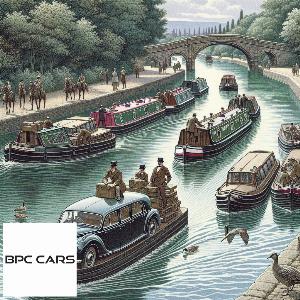Exploring Britain

History of Britain's Industrial Canals
The history of Britain's industrial canals is a fascinating journey into the country's industrial past. These waterways were the lifeblood of the Industrial Revolution, serving as vital transport routes for goods and raw materials. The first canals were built in the 18th century, with the most significant growth occurring between 1770 and 1830. During this period, over 4,000 miles of canals were constructed, connecting major industrial cities and towns. The canals played a crucial role in the growth of industries such as textiles, coal mining, and iron production. However, with the advent of railways in the mid-19th century, the use of canals declined. Today, these historic canals offer a unique way to explore Britain's industrial heritage. By transfer, visitors can easily access key canal sites and enjoy scenic journeys along these historic waterways, witnessing the remnants of the industrial past and the rich biodiversity that has since reclaimed these routes.
transfer Services on Canals
Exploring Britain's industrial canals and waterways has been made easier and more exciting with the introduction of transfer services on canals. These water transfers offer a unique perspective of the country's rich industrial heritage, allowing tourists and locals alike to navigate through the intricate network of waterways that once powered the nation's industrial revolution. The transfer services provide a convenient and enjoyable way to explore the scenic routes, passing through historic towns, old mills, and warehouses that line the canals. The water transfers are equipped with all the necessary amenities to ensure a comfortable journey, including knowledgeable guides who provide insightful commentary on the history and significance of the landmarks along the way. This innovative mode of transport not only offers a novel way to explore Britain's industrial past, but also contributes to the preservation and appreciation of these historic waterways. So, hop on a canal transfer and embark on a journey through Britain's industrial heartland.
Safety Measures for Canal transfers
Exploring Britain's industrial canals and waterways by transfer is a unique and exciting experience. However, safety should always be a priority. Canal transfers are generally safe, but passengers should still take certain precautions. Firstly, always ensure that the transfer is licensed and the driver is experienced. Check for life jackets and other safety equipment on board. Avoid leaning over the edge and keep your hands inside the boat at all times to prevent accidents. It's also advisable to check the weather forecast before your trip, as severe weather can make canal travel dangerous. If you're travelling with children, keep a close eye on them and make sure they understand the importance of staying seated. Lastly, remember that canals and waterways can be unpredictable, so always listen to the advice of your driver and respect the water. With these safety measures in place, you can enjoy a memorable journey through Britain's historic canals and waterways.
Economic Impact of Canal transfers
The introduction of canal transfers in Britain's industrial canals and waterways has had a significant economic impact. These transfers have not only provided a unique and enjoyable way for tourists to explore the country's rich industrial heritage, but have also created new job opportunities and boosted local economies. The canal transfer industry has seen a surge in growth, with an increasing number of tourists opting for this mode of transport. This has led to increased revenue for transfer operators and related businesses such as cafes, restaurants, and souvenir shops located along the canals. Furthermore, the revitalization of these waterways has led to an increase in property values in the surrounding areas. The canal transfers have also encouraged sustainable tourism, reducing the carbon footprint by offering a green mode of transport. Overall, the canal transfers have proven to be a successful venture, contributing significantly to the economic growth of Britain's industrial canal regions.
Environmental Impact of Canal transfers
Canal transfers are an innovative and eco-friendly way to explore Britain's industrial canals and waterways. These waterborne transfers not only offer a unique perspective of the country's rich industrial heritage but also significantly reduce the environmental impact of tourism. Unlike traditional road transport, canal transfers produce no air pollution, helping to improve air quality. They also reduce traffic congestion and noise pollution, contributing to a more peaceful and enjoyable experience for visitors. Furthermore, canal transfers promote the use of renewable energy sources, as many are powered by electric or hybrid engines. This sustainable mode of transport also encourages the preservation of Britain's historic canals and waterways, which are vital habitats for a variety of wildlife. In conclusion, canal transfers are not just a fun and interesting way to explore Britain's industrial past, they are also a green and sustainable choice that helps to protect the environment for future generations.
Future of Britain's Industrial Canals
The future of Britain's industrial canals holds immense potential for exploration and tourism. These historic waterways, once the lifeblood of the Industrial Revolution, are now being revitalized and repurposed for leisure and tourism. The concept of exploring these canals by transfer is gaining popularity, offering a unique perspective of Britain's industrial heritage. These canal transfers not only provide an eco-friendly mode of transport but also a chance to delve into the rich history of the waterways. The future vision includes the development of more canal-side attractions, eateries, and accommodation, enhancing the overall visitor experience. Moreover, the restoration of these canals is expected to boost local economies and create jobs, while preserving the country's industrial past. The future of Britain's industrial canals is bright, promising a unique blend of history, culture, and nature, all accessible by transfer. This innovative approach to tourism is set to redefine the way we explore Britain's industrial heritage.
Our Latest Blog Posts

From London Airports: A Minicab Tour of Britain
Blog about From London Airports: A transfer Tour of Britain
Read More
From London Airports: Minicab Rides to Britain
Blog about From London Airports: transfer Rides to Britain
Read More
A Taxi Trip Through Britains Network Of Historic Canals And Waterways
Information about A Taxi Trip Through Britains Network Of Historic Canals And Waterways
Read More
Exploring Britains Eccentric And Unusual Art Galleries By Taxi
Information about Exploring Britains Eccentric And Unusual Art Galleries By Taxi
Read MoreBlogs Pages
Discovering Britain

Blog about Discovering Britain...
Read MoreDiscovering Britain

Blog about Discovering Britain...
Read MoreFrom London Airports: Minicab Rides to Britain

Blog about From London Airports: transfer Rides to Britain...
Read MoreMinicab Journeys to Britain

Blog about transfer Journeys to Britain...
Read MoreExploring Britains Urban Renewal Projects And Regenerated Areas By Taxi

Information about Exploring Britains Urban Renewal Projects And Regenerated Areas By Taxi...
Read MoreA Taxi Trip To Britains Most Famous Boarding Schools And Academies

Information about A Taxi Trip To Britains Most Famous Boarding Schools And Academies...
Read MoreFrom London Airports: Minicab Rides to Britain

Blog about From London Airports: transfer Rides to Britain...
Read MoreMinicab Journeys to Britain

Blog about transfer Journeys to Britain...
Read MoreExploring Britain

Blog about Exploring Britain...
Read MoreMinicab Journeys to Britain

Blog about transfer Journeys to Britain...
Read More

